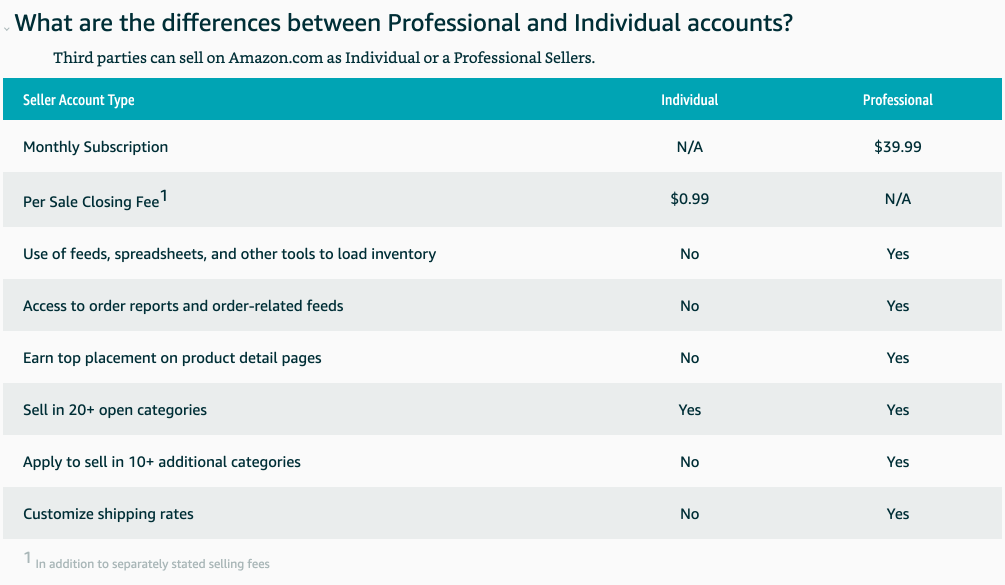Selling on Amazon? One of the first decisions you have to make is choosing whether to register for a Professional or Individual Amazon Seller Account.
An Amazon Professional Seller Account has a monthly subscription fee of USD39.99, while an Individual Seller Account which has no monthly subscription fee. While the Individual Seller plan seems "free", there are several important differences you should be aware of in order to make an informed decision.
But first, make sure you are not confused into thinking that the Individual selling plan is for individuals, while the Professional selling plan is for companies. This is not the case.
Selling as an individual (under your own personal name) or as a registered business/company (such as an LLC, sole proprietor, or private limited company) has nothing to do with the Amazon Individual or Professional seller account types. They are separate issues.
The Amazon Seller Account types are just bad, misleading account plan names. You can register for either selling plan as an individual (your name), business (such as a sole proprietor or partnership or LLP), or company (LLC, Pte/Pty Ltd or Ltd).
But first, make sure you are not confused into thinking that the Individual selling plan is for individuals, while the Professional selling plan is for companies. This is not the case.
Selling as an individual (under your own personal name) or as a registered business/company (such as an LLC, sole proprietor, or private limited company) has nothing to do with the Amazon Individual or Professional seller account types. They are separate issues.
The Amazon Seller Account types are just bad, misleading account plan names. You can register for either selling plan as an individual (your name), business (such as a sole proprietor or partnership or LLP), or company (LLC, Pte/Pty Ltd or Ltd).
The main differences between account types
1) Fees
The Professional Seller account has a fixed USD39.99 monthly fee. The Individual Seller Account has no monthly fee, but has an additional $0.99 per item sold fee. Therefore the tipping point in terms of account fee cost is 40 or more items sold per month. Once you sell 4 units or more monthly, it is more cost effective to pay the monthly fee for a Professional Seller Account.
For example, I sell several thousand units per month, it would make no sense for me to have a "free" individual seller account, but end up paying say $3000 more in per item fees due to selling 3000 units a month. That would be penny wise pound foolish.
2) Selling in Amazon Restricted Categories (aka Gated categories)
Only Professional Sellers can apply for approval to sell in restricted categories/sub-categories.
3) Amazon Advertising
Only Professional Selling Accounts can run Amazon Sponsored Ads. This is very important for selling on Amazon, especially for private label(s) listings.
4) Account Tagging
in Amazon's CRM (which stands for Customer Relationship Management system), which is the database used by Amazon account managers to service and support seller accounts. Only Professional accounts are tagged and can be found by Amazon account managers in the CRM. In other words, if an Amazon account manager is assigned to help you and searches for your account, they cannot find it if it was never a Professional account.
Therefore, Amazon management advises to first register as a Professional Seller, and then if you do not want/are not ready to pay for a Professional account yet, then login to your seller account and downgrade your plan. This way, your account has already been tagged in the system and can be supported by account managers.
The Professional Seller account has a fixed USD39.99 monthly fee. The Individual Seller Account has no monthly fee, but has an additional $0.99 per item sold fee. Therefore the tipping point in terms of account fee cost is 40 or more items sold per month. Once you sell 4 units or more monthly, it is more cost effective to pay the monthly fee for a Professional Seller Account.
For example, I sell several thousand units per month, it would make no sense for me to have a "free" individual seller account, but end up paying say $3000 more in per item fees due to selling 3000 units a month. That would be penny wise pound foolish.
2) Selling in Amazon Restricted Categories (aka Gated categories)
Only Professional Sellers can apply for approval to sell in restricted categories/sub-categories.
3) Amazon Advertising
Only Professional Selling Accounts can run Amazon Sponsored Ads. This is very important for selling on Amazon, especially for private label(s) listings.
4) Account Tagging
in Amazon's CRM (which stands for Customer Relationship Management system), which is the database used by Amazon account managers to service and support seller accounts. Only Professional accounts are tagged and can be found by Amazon account managers in the CRM. In other words, if an Amazon account manager is assigned to help you and searches for your account, they cannot find it if it was never a Professional account.
Therefore, Amazon management advises to first register as a Professional Seller, and then if you do not want/are not ready to pay for a Professional account yet, then login to your seller account and downgrade your plan. This way, your account has already been tagged in the system and can be supported by account managers.
Here's a table from Amazon that shows some of the main differences between the two selling plans:
So Which Amazon Selling Plan Should You Choose?
The Professional Selling plan comes with several important advantages for a minimal monthly fee.
Personally, I started with a professional selling account from day one. Being a thinker more than a doer, or as my psychologist friend would say, having a primarily abstraction aptitude rather than an action aptitude, I wanted to feel the pinch from the $39.99 monthly fee as a way to motivate myself to take action asap.
If you are serious about selling on Amazon, you would definitely be selling more than 40 units per month! In that case, a Professional selling plan with the lower per unit cost, the ability to apply to sell in restricted categories, access to running Amazon Advertising, and potentially better seller support if needed, make it a no-brainer to choose the Professional over the Individual seller account.
Even if you have 1 listing that is only just launching, you would want to have the Professional account in order to run Amazon Sponsored Product PPC (Pay-per-click) ads.
The only scenario where you might downgrade from a Professional to an Individual plan is after registration, is if you are in a period where you know you will be selling less than 40 units in the next 30 days, and also have no need to run Amazon Sponsored Ads.
Finally, before you start registering for an Amazon seller account, I strongly suggest you first read through the Seller Identity Verification guide provided by Amazon to minimize the risk of having your seller account registration facing problems such as suspension or rejection.
Personally, I started with a professional selling account from day one. Being a thinker more than a doer, or as my psychologist friend would say, having a primarily abstraction aptitude rather than an action aptitude, I wanted to feel the pinch from the $39.99 monthly fee as a way to motivate myself to take action asap.
If you are serious about selling on Amazon, you would definitely be selling more than 40 units per month! In that case, a Professional selling plan with the lower per unit cost, the ability to apply to sell in restricted categories, access to running Amazon Advertising, and potentially better seller support if needed, make it a no-brainer to choose the Professional over the Individual seller account.
Even if you have 1 listing that is only just launching, you would want to have the Professional account in order to run Amazon Sponsored Product PPC (Pay-per-click) ads.
The only scenario where you might downgrade from a Professional to an Individual plan is after registration, is if you are in a period where you know you will be selling less than 40 units in the next 30 days, and also have no need to run Amazon Sponsored Ads.
Finally, before you start registering for an Amazon seller account, I strongly suggest you first read through the Seller Identity Verification guide provided by Amazon to minimize the risk of having your seller account registration facing problems such as suspension or rejection.

